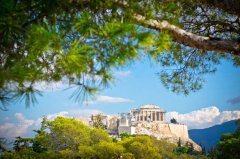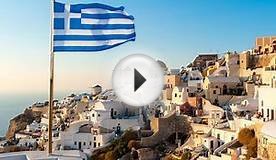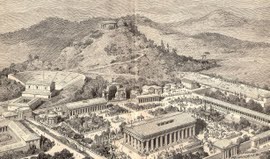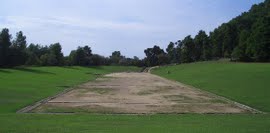Fast Facts about Greece

 Chances are you learned a lot about Greece in history class throughout the years, and tourists flock to this fascinating country year after year. Some come for the historic monuments and stories, of course. You’d expect that from one of the oldest civilizations in the world.
Chances are you learned a lot about Greece in history class throughout the years, and tourists flock to this fascinating country year after year. Some come for the historic monuments and stories, of course. You’d expect that from one of the oldest civilizations in the world.
Others come for the food, and we can’t say that we blame them for that either. And if food and history aren’t your cup of tea, well, you could come for the islands, or the mountains, or any other number of reasons.
Honestly, we think you should visit for all the reasons listed above, and more, but we will leave the exact motives up to you. This article will touch on only a few interesting facts about Greece, but trust us when we say, there is so much more awaiting you there. You will love every minute you spend enjoying the sunshine on the beach, or looking at some of the oldest monuments you can find.
1. Greece’s capital is one of the oldest cities in the world
Athens is the capital of Greece, and the first inhabitants to this city were present around the 11th-7th millennium BC. That makes it one of the world’s oldest cities. Athens is a mix of the old and the new, a draw for many tourists today.
You can visit structures like the Parthenon, the Acropolis or the Roman-era Philopappos Monument and revel in ancient history or experience a more modern Greece. Or you can do both in the same day if you choose. It’s no wonder that over 40% of Greece’s citizens live in the capital city of Athens.
 2. The Parthenon was built to honor Athena
2. The Parthenon was built to honor Athena
You probably remember learning about the Parthenon in high school history class, but perhaps you didn’t realize how fascinating (and important) this building really was. It was originally built as a temple dedicated to the goddess Athena in 438 BC.
The Parthenon is considered one of the world’s greatest monuments. While built as a temple, it was mainly used as a treasury, and in the 5th century, was converted into a Christian church. Once the Ottoman Empire took over, it was converted into a mosque in the 1460s.
It was then when the sacred building was damaged, after an ammunition dump was ignited and exploded, causing severe damage to the building and the sculptures within it.
3. Yes, Athens was named after Athena, and Poseidon wasn’t very happy about that
In Greek mythology, it’s said that the first king of Athens, Cecrops, needed to find a patron deity for the city-state of Athens. Two Greek gods were interested in the position, the first being Poseidon, the god of the seas, and the second being Athena, the goddess of wisdom and skill.
 Cecrops asked them to both offer a gift that would be valuable to the city. Poseidon offered up water, which as many can imagine, would be extremely valuable. However, the water was salty and not at all useful for the population.
Cecrops asked them to both offer a gift that would be valuable to the city. Poseidon offered up water, which as many can imagine, would be extremely valuable. However, the water was salty and not at all useful for the population.
Athena created an olive tree, a symbol of peace and prosperity, and the king was impressed with her gift, thus giving her the honor and naming the city after her. Poseidon wasn’t too pleased about this and cursed the city of Athens to never have enough water from that day forward.
4. Speaking of olive trees, there’s something you should know
Greece is the third largest producer of olives in the entire world. Olive trees have been planted by the Greeks since ancient times, and continue to be big business even today. Considering the popularity of olives in Greek food, it should come as no surprise.
There are estimated to be around 120, 000, 000 olive trees in Greece, and some of the olive trees from the 13th century are still producing olives today.
5. Greece has more islands than you can count
Yes, that’s a fact. It’s estimated that Greece has anywhere from 1, 200 to 6, 000 islands, depending on the minimum size to take into account. But of all of these islands, only between 166 and 227 are inhabited. The largest of the Greek islands is Crete which is at the southern edge of the Aegean Sea, but there is an island to fit any mood.
Interested in picturesque views with adorable villas perched high above the world? Santorini might be perfect for you. Looking to relax by a beautiful beach, Hydra sounds right up your alley. Each island is a little different, with its own unique appeal. It’s definitely worth checking out if you ever get tired of hanging out on the mainland!
6. Greece has over 100 archeological museums
Possibly more than any other country, Greece has a large number of archaeological museums for history buffs to explore. Often located near excavation sites, these museums offer a glimpse into the vast history of ancient Greece.



|
2014 World Cup Watcher Mobile Application (Lello Labs)
|
 Olympia (Greek: Ολυμπία Olympía), a sanctuary of ancient Greece in Elis, is known for having been the site of the Olympic Games in classical times, comparable in importance to the Pythian Games held in Delphi. The Olympic Games were held every four years, dating back to 776 BC. In 394 AD, emperor Theodosius I abolished them as they were then...
Olympia (Greek: Ολυμπία Olympía), a sanctuary of ancient Greece in Elis, is known for having been the site of the Olympic Games in classical times, comparable in importance to the Pythian Games held in Delphi. The Olympic Games were held every four years, dating back to 776 BC. In 394 AD, emperor Theodosius I abolished them as they were then...
 The arts of ancient Greece have exercised an enormous influence on the culture of many countries all over the world, particularly in the areas of sculpture and architecture. In the West, the art of the Roman Empire was largely derived from Greek models. In the East, Alexander the Great's conquests initiated several centuries of exchange between...
The arts of ancient Greece have exercised an enormous influence on the culture of many countries all over the world, particularly in the areas of sculpture and architecture. In the West, the art of the Roman Empire was largely derived from Greek models. In the East, Alexander the Great's conquests initiated several centuries of exchange between...